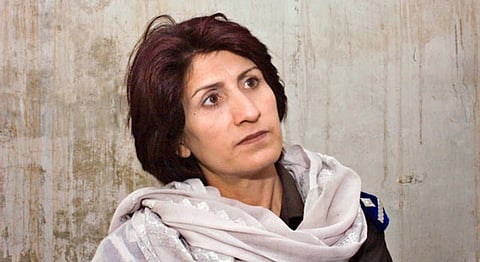
- #HGCREATORS
- #HGEXPLORE
- #HGVOICES
- #HGSHOP
- CAREERS
- ABOUT US
- CONTACT US

In 1984, the Afghans set out on a war—the first in the series of Anglo-Afghan wars—to push out the British troops that had occupied their land. While everyone knows that the British retreated from Kabul unable to match the Afghans, very few know the story of Malalai. It is believed that not only did she lay her life in sacrifice for her country, but also gave the rest of the troops the motivation to win the battle.
Decades since, Afghanistan has seen several other Malalais, who, true to their name, dedicated their life to their nation. Born in 1967, Mallai Kakakar is one of the most phenomenal women that the country had the privilege of calling their own.

Mother to six from southern Kandahar city, Kakar was the head of Kandahar’s department of crimes against women, at a time when being a woman in the country was anything but easy. Following in the footsteps of her father, Kakar joined the police forces in 1982, becoming the first female to graduate from the regional police academy. She went on to command a unit that fights crimes against women in a city, where men believed that women did not deserve any rights.
Being a policewoman in a male-dominated society
Kakar was one of the few hundred female police officers in Afghanistan at the time. By the end of 2009, there were about 500 active duty policewomen in Afghanistan, compared with about 92,500 policemen.

The culture of Afghanistan is marked by a strict separation of the sexes. It was not considered right for male soldiers or police to enter premises where women are present; men were not allowed to check women for concealed weapons and other contraband. In a country where a female officer was required to enter first in order to ensure that the decorum was not violated, the need for women to take up the duty of police officer to fight the war against insurgents could not be more glaring.
According to a report released by Oxfam in September 2013, the national police force employed 1,551 women out of 157,000 personal as opposed to 180 women out of 53,400 in 2005. During Kakar’s time, being a police officer, in general, was extremely difficult. In the first six months of the Taliban rule, it is believed that they killed 700 officers.
In the deeply conservative provinces, women face disapproval from the family and society. But, for the female population of the country, who had no one else to turn to, the female presence in the justice system meant a lot.

Being a woman, she had to wear a burqa every time she left the comfort of her home. Clad in her over-sized uniform (the police academy probably never thought a woman would be wearing one), she would throw a powder-blue coloured burqa on herself before heading to the station. However, she saw the traditional covering she wore outside the office simply as an extra layer of security rather than a burden.”I am not forced to wear the chaudari [burqa], my husband or the police force does not require it. I want to wear it because it gives me advantages,” she told a documentary film-maker before her death. “I wear it to protect my family and myself.”
The tragedy that was her death
Being the head of a unit that fights crimes against women, she was an icon of comfort for many. She was known for her bravery, efficiency, and more importantly, her empathetic attitude towards the women who sought her help. Regardless of the crime, she made sure that she tracked down the perpetrators and made them pay. Even though most of her work included tracking down violent husbands and thieves, she is most remembered for killing three would-be assassins in a shoot-out. The incident caused her to gain popularity with the international media.
When the hard-line Taliban took over the country, the country that was growing to be a bustling commercial centre was reduced to being a mere birthplace of Islamic fundamentalists. Strict interpretation of the Sharia law was imposed and the women suffered for it. At this time they banned women from joining the police, as it was against sharia beliefs. Unable to deal with the Taliban, she left for Pakistan, where she stayed for the next ten years. It was here that she met her husband. When the Taliban fell, she returned to the city and the job that she loved.

In 2006, when the Taliban offensive started again, so did the threats to Kakar. But this time, she was determined to not be deterred. “Her life was threatened many times, and she never gave up because she was empowered by the women around her, and she really felt what she was doing was important,” photographer Lana Slezic said.
‘Brave’ is not an adjective that will suffice here. She probably knew what would happen to her eventually, but she never gave in. For over five years, her brother drove her to work, ensuring that they did not take the same route twice in a row. Every morning, before her children woke up, she would check for threat notes that had been pinned to her door the previous night. However, one fateful morning of 18 September 2008, she has shot dead in her car, outside her house. She was on her way to work. The Taliban claimed responsibility for her death.
Malalai Kakar was not the first woman to suffer such a tragic fate, and she was definitely not the last. As we add her name to the list of iconic women in history whose valiant sacrifices the world should recognise, we can only hope that Afghanistan’s society reaches a point where more women are given the opportunity to fight for human rights and the safety of their own country.
